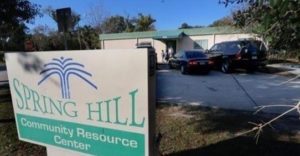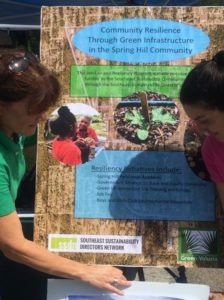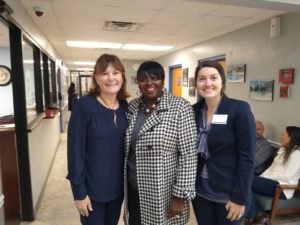Volusia County, FL: An All Ages Approach to Community Resiliency

If you hear the words “flooding” and “Florida” in the same sentence, you would not be alone in thinking of a beachfront community. However, inland areas in Florida can be just as, if not more, susceptible to flooding than their coastal neighbors Spring Hill, a neighborhood in DeLand, Florida, has experienced repeated flooding for years. So when Volusia County Environmental Management staff were applying for a Southeast Sustainability Communities Fund (SSCF) grant from the Southeast Sustainability Directors Network (SSDN), a program supported by The Kendeda Fund and The Kresge Foundation, Spring Hill was the obvious choice of community. The County was awarded the grant for their program Community Resiliency through Green Infrastructure in Volusia County, Florida in 2019.
The SSCF grant’s purpose was two-fold, with infrastructure and educational goals. In the shorter-term, the grant was used for both green industries workforce training for residents of the community, which was offered first with an instructor-led training and then virtually to accommodate residents’ needs, and for a job fair at the annual Spring Hill T.U.R.N (To Unite Rebuild and Network) Festival. Grant funds are being used to build the next generation of resilience leaders through youth education programs by developing a curriculum that can be taught for years to come. In the long-term the goal is to build a Resilience Team that continues to support and represent the Spring Hill community in addressing resilience issues.
This initiative will ultimately demonstrate proof of concept for the use of educational resiliency academies to promote green infrastructure projects as an adaptive approach to flooding and to improve community resilience and health.
The vision, beyond the conclusion of this grant cycle, is that Spring Hill is a healthy and thriving community because it has been successful in obtaining equal access to green infrastructure funding, which reduces the amount of pollution in stormwater and alleviates the disproportionate flooding. This initiative will serve as a stepping-stone to help the Spring Hill community achieve racial equity through implementation of sustainable best practices as well as Earth Jurisprudence and Environmental Justice principles.
Want program success? Listen first.
Acutely aware of the unfortunate limited success of past grant-funded programs for lasting community engagement and change, Volusia County staff partnered with a variety of public and private organizations. Together with the Center for Earth Jurisprudence at Barry University, the Spring Hill Resource Center, and the Lacey Family Spring Hill Boys & Girls Club, this program creates space for deep listening of those who live and work in Spring Hill.
Learning and training for every age
 Since the ultimate goal of the SSCF grant program is to create programming and infrastructure that will continue on long past the last day of the grant, every area of the project has been crafted through the lens of continuous, lifelong learning. This means creating access points for students as young as elementary and middle school all the way up to long-term residents of retirement age. It also means working with trusted leaders in the community, including Shilretha Dixon, Director of the Spring Hill Resource Center, Althea Chavers, Unit Director at the Lacey Family Spring Hill Boys & Girls Club, and members of the clergy to ensure creation of meaningful learning experience and the development of a Resilience Team. One of the first pieces of education implemented was race and equity training for city and county staff, not just in Volusia County but across Central Florida by inviting other SSDN members to participate. Led by Race Forward’s Government Alliance on Race and Equity (GARE), the day-long training was well attended and the feedback from those trained was positive.
Since the ultimate goal of the SSCF grant program is to create programming and infrastructure that will continue on long past the last day of the grant, every area of the project has been crafted through the lens of continuous, lifelong learning. This means creating access points for students as young as elementary and middle school all the way up to long-term residents of retirement age. It also means working with trusted leaders in the community, including Shilretha Dixon, Director of the Spring Hill Resource Center, Althea Chavers, Unit Director at the Lacey Family Spring Hill Boys & Girls Club, and members of the clergy to ensure creation of meaningful learning experience and the development of a Resilience Team. One of the first pieces of education implemented was race and equity training for city and county staff, not just in Volusia County but across Central Florida by inviting other SSDN members to participate. Led by Race Forward’s Government Alliance on Race and Equity (GARE), the day-long training was well attended and the feedback from those trained was positive.

By working directly with the Lacey Family Spring Hill Boys & Girls Club, Volusia County staff were able to create and implement an educational program that started during the school year and continued over the summer with educational field trips into the community and beyond Spring Hill. Local youth learned about where freshwater comes from, water quality, food supply and food preparation, the animal and plant species that live in the local environment, and water supply and sanitation. Hands-on learning is emphasized to bring concepts to life and make the topic of environmental resilience real. The programming hopes to inspire students to possible careers in sustainability and green infrastructure once they grow up and finish school.
Through the summer, the Boys & Girls Club students experienced planting and growing produce at Spring Hill Community Garden. As an example of an action that will last beyond the grant, West Volusia Audubon, Lowes - Orange City, Green Volusia, and the UF/IFAS Master Gardner program have contributed to redesign and expand the Boys & Girls Club Garden, including the addition of the raised beds. Made possible through additional funding to keep the garden going, this is a place of learning for children, who are encouraged to help maintain the gardens and grow local produce. A community garden is an example of one piece of work that was specifically mentioned by people in Spring Hill as something they valued and wanted to have happen.
Green Infrastructure planting projects, scheduled for 2021, funded through the grant, will incorporate edible plants and fruit trees identified and approved by community members. Staff from the University of Florida’s Florida-Friendly Landscaping program and Department of Environmental Horticulture Center for Landscape Conservation and Ecology are helping to develop green infrastructure training workshops for community residents that will complement the green infrastructure planting projects. The workshops will be designed to share green infrastructure practices and tools with community members that they can utilize on their own properties or elsewhere in the community to reduce flooding.
In February 2020, the first Adult Resiliency Academy, was held on Saturdays for members of the community who were brought together to discuss a book about entrepreneurship as well as what resiliency is and how it can be implemented in the Spring Hill community. Through presentations from guest lecturers, local field trips, and interactive activities the Academy provided a space for community engagement and education.
The first year of the two-year grant was 2019, and year one target goals were met with great success. However, it wasn’t long into 2020 before the COVID-19 pandemic temporarily slowed progress and required program partners to re-think how to execute the work of year two. Building on the youth summer program, the creation of a Youth Resiliency Academy, with a full curriculum that is mindful of COVID restrictions to maintain public health, is in progress. There are plans to work with the University of Florida to hold workshops on green infrastructure, possibly in-person or virtually. One challenge of virtual workshops is internet access. If participants mainly access the internet through a cell phone, how does this impact the virtual workshop experience?
The project has engaged both community members and community leaders to ensure the most effective and lasting outcomes. Both Bob Apgar, the Mayor of DeLand and Barbara Girtman, Volusia County Council Representative have participated in and supported the efforts of the grant.
By continuing to listen, engage, adapt to community needs, and listen again, the partners are working within Spring Hill to create a more resilient community. COVID-19 did put the next phase on hold for a while but partners are working together to facilitate workshops, a resilience academy, and plating project in the Community in 2021.